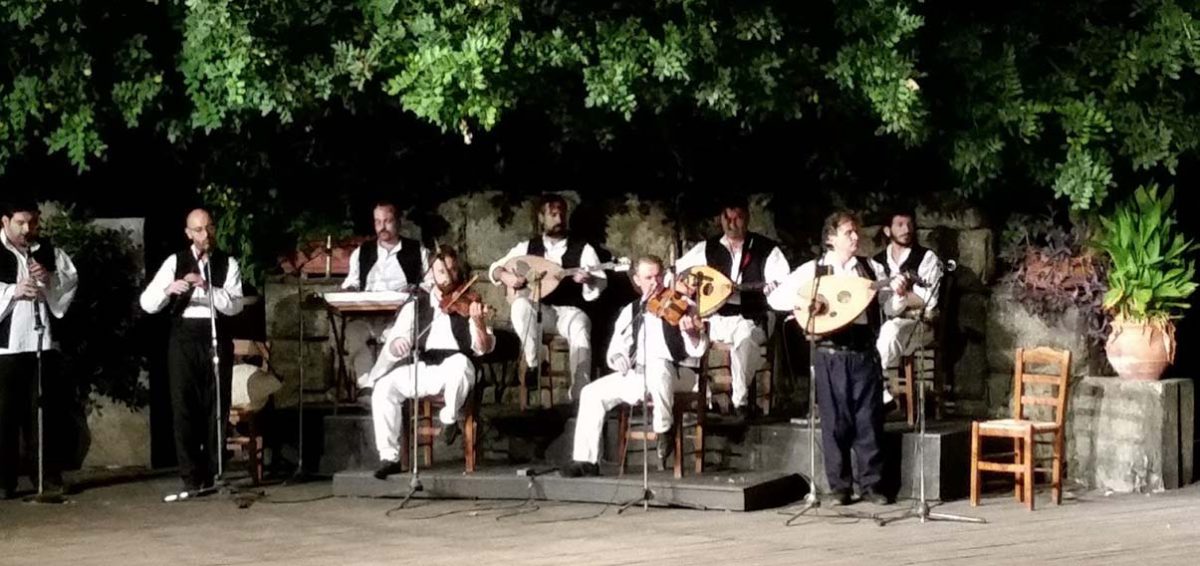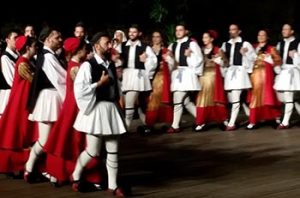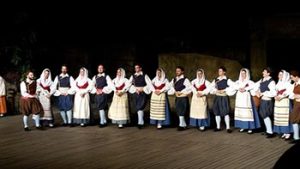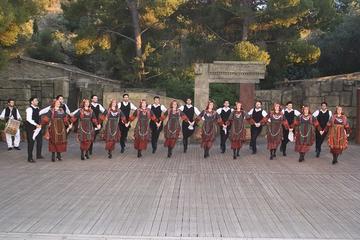
by W. Ruth Kozak
I am sitting in a quiet wooded park area at the foot of Philoppaou Hill near the Acropolis in Athens Greece. It’s a warm September evening and the air is fragrant with pine. Overhead the night sky is littered with stars. On a stage in front of the tiers of seats a group of musicians take their places and begin to play. The melodic, soulful sound of bouzoukis and mandolins stirs the quietness of the night and a group of women step daintily onto the stage, hands clasped, their colorful dresses swaying as they circle the stage. Then the men appear, clad in black, some wearing tassled head scarves, lithe, agile, sturdy, as they bend, twirl and leap.
 These are the famous Dora Stratou Dancers, a company of 75 dancers, musicians and folk singers. I am enthralled as I watch them perform and admire their skill, the precision of their movements, their lightness of foot. I’m amazed and even more impressed when I am told that they are not professional dancers, but young men and women from the villages of Greece, who work at ordinary day-jobs and by night perform on the stage in the woods at the Dora Stratou Dance Theatre. Their beautiful traditional costumes are made in the villages and adorned with folk art specific to the village’s location.
These are the famous Dora Stratou Dancers, a company of 75 dancers, musicians and folk singers. I am enthralled as I watch them perform and admire their skill, the precision of their movements, their lightness of foot. I’m amazed and even more impressed when I am told that they are not professional dancers, but young men and women from the villages of Greece, who work at ordinary day-jobs and by night perform on the stage in the woods at the Dora Stratou Dance Theatre. Their beautiful traditional costumes are made in the villages and adorned with folk art specific to the village’s location.
Greek dancing is an old tradition and there are various styles from all of the islands and mainland areas. Each region has its own choreography. The traditional island dances are fast in pace and have a smooth flow where couples dance. The Pontic dances of the Black Sea area were performed by Pontian soldiers in order to motivate themselves before going into battle, so they are energetic dances accompanied by the Pontian lyra. In contrast, the dances of Epiros are slow and the dancers are required to have good balance. Those of the Peloponnese are simple with the leader of the line improvising. The all have different names such as the hasapiko and sirtaki of Central Greece, the syrtos of the Peloponnese and Kefalonia, the Gaitani and zervos of Thrace.
Dancing is a social function in Greece bringing members of the community together at special times of the year such as Easter, grape harvest time and family get-togethers such as weddings.
 Dora Stratou, founder of the Greek Dances Dora Statou Society, was born in 1903 and brought up in an upper class urban area of Athens. During her lifetime she was a significant contributor to Greek folk dancing and folk music. Her book, Greek Traditional Dances was published in 1979. The book chronicles her passion for Greek dance which led her to establishing one of the most unusual living museums in the world – the Greek Dance Theatre in Athens, where the regional dances of Greece are performed just as they were done hundreds of years ago. She worked along with other ethnomusicologists and kept records of traditions, costumes and folklore. Dora Stratou died in 1988 but her valuable legacy of recorded traditions, music, films of dances and costumes are still an important part of the Dora Stratou Theatre. The company performs outside of Greece as well as inviting other folkloric groups both within Greece and Internationally to perform.
Dora Stratou, founder of the Greek Dances Dora Statou Society, was born in 1903 and brought up in an upper class urban area of Athens. During her lifetime she was a significant contributor to Greek folk dancing and folk music. Her book, Greek Traditional Dances was published in 1979. The book chronicles her passion for Greek dance which led her to establishing one of the most unusual living museums in the world – the Greek Dance Theatre in Athens, where the regional dances of Greece are performed just as they were done hundreds of years ago. She worked along with other ethnomusicologists and kept records of traditions, costumes and folklore. Dora Stratou died in 1988 but her valuable legacy of recorded traditions, music, films of dances and costumes are still an important part of the Dora Stratou Theatre. The company performs outside of Greece as well as inviting other folkloric groups both within Greece and Internationally to perform.
I was fortunate to interview Dr. Alkis Raftis, a tall, handsome gentleman who has been director of the Dora Stratou Dance Theatre for thirty years. He warmly welcomed me and provided me with an armload of magazines about the company as well as answering my questions about the history of the company which began in 1953.
“There are 100 dancers in the Company,” he said, “all non-professionals. There is no choreographer. The dances are authentic from the villages. The musicians are also from the villages. And the costumes are all historically authentic from each area of Greece.”
He said that the school of dance operates all year as does the research. Besides the dance company there are also Greek dance classes for individuals or groups year-round.
I asked about the location of the theatre which is in a treed area down a long road at the foot of Philoppapou Hill. There is a bus service from one end of the area but most visitors must walk the length of the roadway to reach it.
“The setting for the dances must be just like in the village,” he said. “Everything should be authentic.” This is why they chose the idyllic woodland surrounding as their garden theatre.

 If You Go:
If You Go:
The Dora Stratou Dance Theatre performs from May through September every Wednesday, Thursday and Friday at 9.30 pm as well as Saturday and Sunday at 8.15 pm. No reservations are required. If you’re in Athens, be sure and attend this wonderful evening with its ancient traditions and lively music and dance.

Dora Stratou Greek Dancing Show
About the author:
Ruth has been traveling and lived in Greece since 1979 and considers it her second home. She had the privilege of meeting in person with Dr. Alkis Raftis, director of the Dora Stratou Dance Theatre. She has enjoyed many performances of this dance troupe and recommends it for visitors to Athens. Ruth is a historical fiction writer with a two-volume novel Shadow of the Lion: Blood on the Moon and SHADOW OF THE LION: THE FIELDS OF HADES
both available on Amazon.com and the full volume of SHADOW OF THE LION is available on Kindle ebook. She is also a travel journalist and President of the BC Association of Travel Writers.
Photos by W. Ruth Kozak




Leave a Reply
You must be logged in to post a comment.